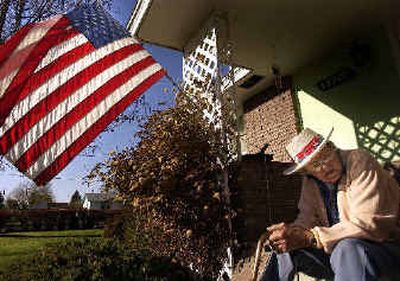Honoring freedom’s heroes

Young and old came to the Spokane Veterans Memorial Arena on Thursday to pay tribute to the men and women who paid the price for freedom.
“We are here to say thank you because it is all that we can do,” said Chief Master Sgt. Wayne Terry, the keynote speaker at this year’s Veterans Day program.
He spoke to veterans of the wars that defined their lives and this nation.
His voice choking with emotion, Terry said thanks are all that we Americans can offer. We cannot give you back the limbs you lost, the time you served for your country or the abuse you suffered while incarcerated by the enemy.
Terry recalled the stories told by his father, who served in Korea at a time when the memories of World War II were still fresh in the nation’s memory.
“Tales of heroism were just part of growing up in America then,” he said.
And when the United States became involved in Vietnam, after overcoming such great strife already in that century, Americans believed the “police action” was nothing to worry about, Terry said.
“But something happened at this time we had not seen before.”
Soldiers were not paid the respect they deserved, draft cards were burned in public and Americans took to the streets in demonstration, “not in support of those that gave us freedom, but in opposition,” Terry said.
Today, with another war raging in Iraq, Terry posed questions that America must ask itself once more: What is the cost of freedom, and who pays that cost?
Among those in the audience Thursday was former prisoner of war Frank Mace, a man who may know the answers to Terry’s questions better than most.
He was at Wake Island on Dec. 23, 1941, when a Japanese invasion force overwhelmed U.S. troops. He spent the next 44 months paying the price for American freedom as a forced laborer in Japan and Japanese-occupied China. Mace said 1,600 American soldiers were captured that day and 40 percent of them did not survive.
“We worked 16 to 18 hours a day on two cups of rice and what we could scrape together,” he said. “It was unhulled rice or I wouldn’t be here today.”
Mace, who was chaplain to his fellow prisoners, said he presided at 450 funerals. He knows because he hid the names of everyone who died in the sweatband of his floppy hat. He credits God with helping him survive the sinking of his prison ship by a U.S. submarine.
He learned he was free on Aug. 18, 1945, when a U.S. plane dropped a message into his Osaka prison camp. Even then, he and fellow prisoners had to commandeer a Japanese train to Yokohama where he caught a hospital ship back to San Francisco.
Thursday’s ceremony ended after Myrtle Sherburn, 81, a Gold Star Mother, laid a wreath for those lost in American wars.
She knows something about sacrifice, as well.
Her son, “Buzz,” died in 1969 when his reconnaissance plane was shot down over the Ho Chi Minh Trail. He was 29 and serving his second hitch in Vietnam.
“He was due to come home, but he didn’t make it,” Sherburn said, a tear appearing on her cheek 35 years later.
There are very few Gold Star Mothers left in Spokane, she said. Sherburn, who attends Veterans Day ceremonies every year, belongs to the Washington, D.C., chapter of the national organization of mothers whose sons died in the service of their country.
“I never joined at first because I was bitter,” she said. “Then I went to the dedication of the Vietnam War Memorial, and I realized, ‘I’m not the only one. Look at all these names on this wall.’ “
She regrets that Vietnam veterans were not recognized when they came home. She would not have wanted her son to be treated that way.
“He fought for what he thought was right,” Sherburn said, “and I came to believe that, too.”